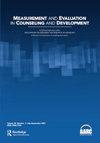Factor Structure of the Self-Compassion Scale in 11 International Samples
IF 2.2
4区 心理学
Q2 Psychology
Measurement and Evaluation in Counseling and Development
Pub Date : 2020-04-01
DOI:10.1080/07481756.2020.1735203
引用次数: 19
Abstract
Abstract In this study, different factor analysis models were employed to test the Self-Compassion Scale (SCS) in 11 distinct populations (n = 15,266) in different countries. The results strongly suggest that the most appropriate use of the SCS is to measure levels of Self-Compassionate responding (positive items) and Self-Uncompassionate responding (negative items) separately.11个国际样本自我同情量表的因素结构
摘要本研究采用不同因素分析模型对11个不同群体(n = 15266)。研究结果强烈表明,SCS最合适的用途是分别测量自我同情反应(积极项目)和自我不热情反应(消极项目)的水平。
本文章由计算机程序翻译,如有差异,请以英文原文为准。
求助全文
约1分钟内获得全文
求助全文
来源期刊
CiteScore
2.40
自引率
10.00%
发文量
21
期刊介绍:
Measurement and Evaluation in Counseling and Development is an official journal of the Association of Assessment and Research in Counseling (AARC), a member association and division of the American Counseling Association. Articles range in appeal from those that deal with theoretical and other problems of the measurement specialist to those directed to the administrator, the counselor, or the personnel worker--in schools and colleges, public and private agencies, business, industry, and government. All articles clearly describe implications for the counseling field and for practitioners, educators, administrators, researchers, or students in assessment, measurement, and evaluation.

 求助内容:
求助内容: 应助结果提醒方式:
应助结果提醒方式:


